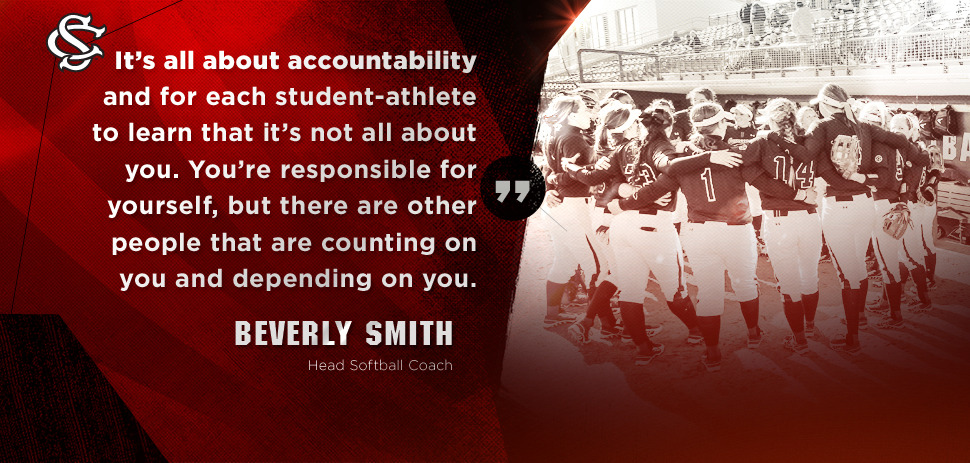
Accountability Program Makes Positive Impact on Gamecock Softball
Oct. 7, 2015

It’s not uncommon to hear an athlete say “I’ve got your back” when talking about teammates. While this is usually an in-game reference for student-athletes supporting each other, the South Carolina softball team has turned it into a full time commitment with its Accountability Partners program.
“It’s all about accountability and for each student-athlete to learn that it’s not all about you,” Head Coach Beverly Smith said. “You’re responsible for yourself, but there are other people that are counting on you and depending on you. So your decisions are important. That’s the message we’re trying to get across. The better you are at that, the better teammate you are going to be, and the better team we are going to be.”
Smith initiated the program three years ago after bringing in a leadership training consultant to meet with the team during the preseason.
“We talked about how in the military there is a spotter with a gunner, and he’s got your back,” Smith said. “Accountability is one of our core values with the softball program. This was a good way for us to continue to implement and teach accountability. It’s something that is constant.”
Each member of the team is paired up with a teammate and they serve as each other’s spotter. Each is held responsible for the other’s actions; whether it’s following team rules, helping newcomers adjust to life at school, or making sure they are making good decisions when away from the team. If an individual falls short of expectations in those areas, then both members of the pair will be subject to the consequences, which normally involves some extra conditioning on the Stairmaster for both student-athletes.
“If one kid gets caught, then the spotter gets punished as well,” Smith said. “For example, it’s a team rule that you go to all of your classes. So if you don’t feel like going to class one day, then you have to ask whether it’s worth getting my spotter in trouble too. Once you realize that it’s not all about ‘me,’ that I’m accountable to this other person, and what I do affects her, then hopefully it makes you do the right thing and get out of bed and get to class.”
“I loved it,” said former catcher Oliva Lawrence, who finished her eligibility last spring and will graduate in December. “We didn’t have the program my freshman year, so when one of the girls did something wrong, there was no accountability for it. This made it so the girls didn’t want to get in trouble. Nobody wanted to get someone else in trouble if they didn’t do anything wrong. So now, if you got punished, you’re spotter was going to be there with you on a Stairmaster, and they weren’t going to be happy about it.”
It makes you responsible for yourself and someone else.
Alaynie Page, Senior Outfielder
The program is not simply about punishment, however. It’s about learning an important life lesson.
“The purpose is to really have someone on the team who always has your back,” Smith added. “So if you have a question or something comes up, you call your ‘spotter.’ They’ve always got your back. If you show up and you have the wrong shirt on for practice, then it should be your spotter that tells you to go change. It’s a quick way to make sure that everyone is on the same page.”
“I enjoy it because it gives you an opportunity to have a connection with different people every year,” senior Alaynie Page said. “It makes you responsible for yourself and someone else. It’s a cool experience to get to know someone on a different level other than just being on the field with them. It makes you think twice because you know that if you get in trouble, then your teammate is getting in trouble with you. “
While it has been a successful deterrent most of the time, sometimes it takes longer to sink in. Page admits that she wasn’t always a good spotter, having been sent to the cardio machine on several occasions during her freshman year.
“I think I held the record my freshman year,” Page said. “Olivia Lawrence was my spotter. I think she hated me that year. I didn’t know what was going on, so I’d bring the wrong shoes one day and we all had to match at practice. I got caught when I didn’t go to class. I’ve only had to do it once since then, though. It’s just not worth it because you always get caught. Doing that Stairmaster is just not fun. The first time you do it, it leaves a bad taste in your mouth. You begin to re-think everything. If we have three practice shirts, you might bring all three of them to practice just to be sure.”
“There are days where you forget your shoes for 6 a.m. workout or you miss your alarm,” Lawrence said. “If you’re wrong, you have to be the one to step up. I was on the Stairmaster a few times the first year when my spotter missed a class or was late, so I started texting her every morning to make sure she was where she needed to be.”
The student-athletes usually receive a new spotter each year, selected by the coaching staff. Normally an upperclassman is paired with an underclassman, and it’s not uncommon for different personalities to be matched, often creating a duo which may be similar to “The Odd Couple.”
“Sometimes you have to match up a few ‘Oscars’ and ‘Felixes’ so they can appreciate each other’s differences and still hold each other accountable,” Smith said. “We challenge some of the older kids with the younger kids. If we think someone is going to be a challenge, we’ll pick a special spotter for them. It helps with team chemistry. The pairs I put together aren’t necessarily matches made in heaven. There are some reasons why we pair people together. I may take somebody with an over-the-top work ethic and pair them with someone whose work ethic needs a little attention.”
“It worked,” Lawrence said. “You make sure that people know where you are. It lets you bond a lot with your spotter. Coach would put an older player with a younger player to show them how you’re supposed to do things, and it’s kind of like big sister/little sister relationship. If the big sister got in trouble, you felt like you disappointed them. It made you bond with someone.”
Despite some differences, the response to the spotters has been extremely positive, and when discipline has been required, there have been very few repeat offenders.
“You really get to know your spotter,” Smith said. “I think it’s the case that they really get to rely on each other. The response has all been positive and it works. We’ve had some upperclassman who make it very clear that they’re not getting on that Stairmaster. They make sure that the freshmen know what to pack on the road and take care of all of the little stuff. It’s something we implemented, and we’ll never change. It’s been very successful.”
As a senior, Page wants to take on more of a leadership role this year and plans on not having any extra conditioning sessions.
“I want to keep everybody accountable for each other’s actions, and not just my spotter” Page said. “This allows us to push each other, and it helps us to become closer.”












